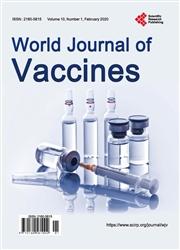Factors Influencing Routine Vaccination of Children of Mothers Live-Stock Retailers in the Markets of Yaoundé
引用次数: 7
Abstract
Background: The job of mothers though having a positive impact on the family could be detrimental to children’s health due to her unavailability. Methodology: A cross-sectional study was carried out from March to August 2014. Mothers of children aged 11 - 48 months were interviewed to determine factors which could influence the vaccination of their children. Results: A total of 265 mothers were interviewed. Despite their occupations, they completely vaccinated all of their children. The vaccination coverage of tracer antigens (third dose of DPT/HiB/HepB) was high 97.7% as well as the proportion of children completely vaccinated (91.7%). A mastery of the vaccination calendar of the site, and resumption of activities when the children were more than 4 months old, significantly influenced the completion of vaccination. Only 6 children (2.3%) were not correctly or incompletely vaccinated. The reason given by their mothers were: the lack of time (45.0%), the adverse effects of vaccines (27.0%), forgetfulness (18%), and shortage of vaccines supplies (5.0%). Conclusions: Occupation was not a hindrance to the vaccination of children of live-stock retailers. The problem of absent or incomplete vaccination could be overcome by improving the strategies of social mobilisation, permitting the sensitisation of mothers hesitant to vaccinate their children. A regular supply of vaccines will reduce the missed opportunities, thus maintaining high vaccination coverage in this social group.影响温州市集家畜零售商母亲子女常规疫苗接种的因素
背景:母亲的工作虽然对家庭有积极影响,但由于母亲不能上班,可能对儿童的健康有害。方法:横断面研究于2014年3月至8月进行。对11至48个月儿童的母亲进行了访谈,以确定可能影响其儿童接种疫苗的因素。结果:共访谈265位母亲。尽管他们的职业,他们完全接种了他们所有的孩子。示踪抗原(DPT/HiB/HepB第三剂)的疫苗接种率高达97.7%,完全疫苗接种率为91.7%。掌握现场的疫苗接种日历,并在儿童4个月以上时恢复活动,对疫苗接种的完成有显著影响。只有6名儿童(2.3%)没有正确或不完全接种疫苗。母亲给出的原因是:时间不够(45.0%)、疫苗不良反应(27.0%)、健忘(18%)和疫苗供应不足(5.0%)。结论:职业对家畜零售商儿童接种疫苗没有阻碍作用。通过改进社会动员战略,使那些对是否给孩子接种疫苗犹豫不决的母亲认识到这一点,可以克服缺乏或不完全接种疫苗的问题。定期提供疫苗将减少错过的机会,从而在这一社会群体中保持较高的疫苗接种覆盖率。
本文章由计算机程序翻译,如有差异,请以英文原文为准。
求助全文
约1分钟内获得全文
求助全文

 求助内容:
求助内容: 应助结果提醒方式:
应助结果提醒方式:


